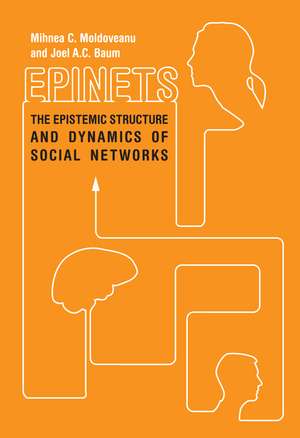Epinets: The Epistemic Structure and Dynamics of Social Networks
Autor Mihnea Moldoveanu, Joel Baumen Limba Engleză Paperback – 31 ian 2015
Epinets presents a new way to think about social networks, which focuses on the knowledge that underlies our social interactions. Guiding readers through the web of beliefs that networked individuals have about each other and probing into what others think, this book illuminates the deeper character and influence of relationships among social network participants.
Drawing on artificial intelligence, the philosophy of language, and epistemic game theory, Moldoveanu and Baum formulate a lexicon and array of conceptual tools that enable readers to explain, predict, and shape the fabric and behavior of social networks. With an innovative and strategically-minded look at the assumptions that enable and clog our networks, this book lays the groundwork for a leap forward in our understanding of human relations.
Drawing on artificial intelligence, the philosophy of language, and epistemic game theory, Moldoveanu and Baum formulate a lexicon and array of conceptual tools that enable readers to explain, predict, and shape the fabric and behavior of social networks. With an innovative and strategically-minded look at the assumptions that enable and clog our networks, this book lays the groundwork for a leap forward in our understanding of human relations.
| Toate formatele și edițiile | Preț | Express |
|---|---|---|
| Paperback (1) | 222.81 lei 6-8 săpt. | |
| Stanford University Press – 31 ian 2015 | 222.81 lei 6-8 săpt. | |
| Hardback (1) | 700.42 lei 6-8 săpt. | |
| Stanford University Press – 4 mar 2014 | 700.42 lei 6-8 săpt. |
Preț: 222.81 lei
Nou
Puncte Express: 334
Preț estimativ în valută:
42.64€ • 44.61$ • 35.42£
42.64€ • 44.61$ • 35.42£
Carte tipărită la comandă
Livrare economică 02-16 aprilie
Preluare comenzi: 021 569.72.76
Specificații
ISBN-13: 9780804795289
ISBN-10: 0804795282
Pagini: 200
Dimensiuni: 152 x 229 x 18 mm
Greutate: 0.3 kg
Editura: Stanford University Press
Colecția Stanford Business Books
ISBN-10: 0804795282
Pagini: 200
Dimensiuni: 152 x 229 x 18 mm
Greutate: 0.3 kg
Editura: Stanford University Press
Colecția Stanford Business Books
Recenzii
"Epinets is a demanding and brilliant book. It demands and deserves from its audience a very close read . . . Moldoveanu and Baum not only engage in an act of intellectual brokerage between epistemic game theory (and related fields) and network analysis to introduce what they refer to as spinets (networks of agents' beliefs); they also seek - staying with Burt's (2005) theory - to 'seed and catalyze closure' among diverse researchers committed to the epistemic turn in social science that they propose . . . [A] remarkably smart and creative book that is likely to shape the intellectual landscape far into the future. We strongly encourage others to read and especially to use it."—Matthew S Bothner and Henning Piezunka, Administrative Science Quarterly
"By articulating the power of attending tot he epistemic 'glue' underlying social networks, Epinets reveals the way in which social relationships become a rich substrate for cognition, belief, and evaluation in the world. This book persuades that together, appropriate measurement of social and epistemic ties will not only explain but anticipate many social phenomena beyond the current purview of network analysis . . . I highly recommend this book."—James A. Evans, American Journal of Sociology
"Moldoveanu and Baum fill a gap in the field of network analysis with their book concerning the epistemic underpinnings of social networks . . . What people's contacts on social networks really know is indeed a tantalizing issue. The authors portray this knowledge about others as a sort of epistemic glue as they delve into the truth of human relationships mediated over networks. The book is surprisingly easy to read and is meant to be helpful in the accessible way that a smartphone app is . . . Recommended."—C. Wankel, CHOICE
"Epinets offers a really exciting new lens for social network analysis, grounded in excellent scholarly work. Joel Baum and Mihnea Moldoveanu's ideas are both intriguing and demanding, yet always presented in clear and accessible language."—Woody Powell, Stanford University, Co-author of The Emergence of Organizations and Markets
"Cognition and behavior are increasingly used as variables in social network theory, but Moldoveanu and Baum leapfrog evolution to analyze the purely cognitive underpinnings of social networks. Your epinet refers to your understanding of how other people see you and one another within your network. Combining network analysis with the reflected self- and emotional intelligence, Epinets serves up a buffet of innovation and insight."—Ronald S. Burt, Hobart W. Williams Professor of Sociology and Strategy, University of Chicago Booth School of Business
"With Epinets, Joel Baum and Mihnea Moldoveanu have created a comprehensive epistemic paradigm challenging the mechanisms behind well-established ideas in social network theory and research. It is a brilliant, fully thought-through tour-de-force complete with theory, constructs, models, language, and empirics. Especially interesting for me is the conjoining of trust with epinets, producing original and sometimes startling findings regarding traditional network roles and trust."—Aks Zaheer, Professor, Carlson School of Management, University of Minnesota
"What your contacts really know remains one of the most intriguing and mysterious quandaries of a powerful social network. Baum and Moldoveanu offer a treasure of insights for solving this puzzle and one thing more—a system, called the Epinet, that illuminates how to grasp and authenticate hidden network knowledge and the competitive benefits of making the unknown known."—Brian Uzzi, Richard L. Thomas Distinguished Professor of Leadership, Kellogg School of Management, Northwestern University
"With Epinets, Joel Baum and Mihnea Moldoveanu have created a comprehensive epistemic paradigm challenging the mechanisms behind well-established ideas in social network theory and research. It is a brilliant, fully thought-through tour-de-force complete with theory, constructs, models, language, and empirics. Especially interesting for me is the conjoining of trust with epinets, producing original and sometimes startling findings regarding traditional network roles and trust."—Aks Zaheer, Professor, Carlson School of Management, University of Minnesota
"What your contacts really know remains one of the most intriguing and mysterious quandaries of a powerful social network. Baum and Moldoveanu offer a treasure of insights for solving this puzzle and one thing more—a system, called the Epinet, that illuminates how to grasp and authenticate hidden network knowledge and the competitive benefits of making the unknown known."—Brian Uzzi, Richard L. Thomas Distinguished Professor of Leadership, Kellogg School of Management, Northwestern University
Notă biografică
Mihnea C. Moldoveanu is Director of the Desautels Centre for Integrative Thinking at the Rotman School of Management, University of Toronto, where he is also the Associate Dean of the Full Time MBA Program. He is also the Founder, past CEO, and CTO of Redline Communications, Inc., a leading manufacturer of broadband wireless equipment for commercial and military communications. Joel A.C. Baum is the George E. Connell Chair in Organizations and Society and Associate Dean, Faculty at the Rotman School of Management, University of Toronto. He was a founding co-editor of Strategic Organization and served for over a decade as Editor-in-Chief of Advances in Strategic Management.
Descriere
Epinets fleshes out a new language for talking about the knowledge and beliefs that underpin communication in social networks. This book better enables readers to explain, predict, and intervene in the epistemic fabric of social interactions.

























